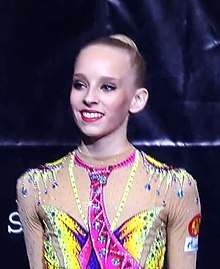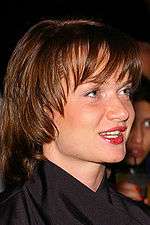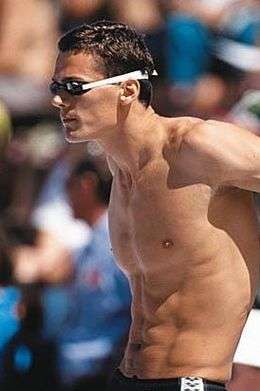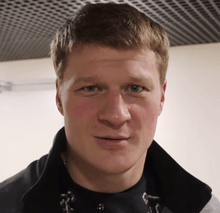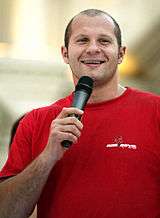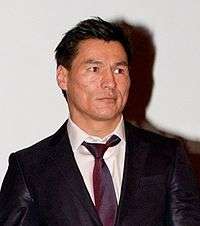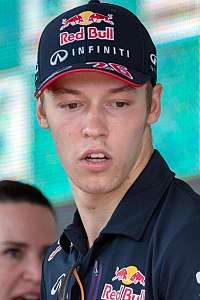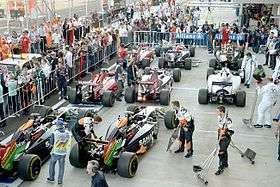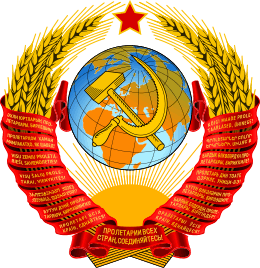Sport in Russia
The most popular sport in Russia is football.[1] According to Yandex search analysis results rating of the most popular sports among Russians: "Football topped the list of the most popular sports in Russia" with 5 to 10 million requests. Ice hockey came in second with handball, basketball, futsal, boxing, auto racing, volleyball, athletics, tennis and chess rounding out the top ten rankings.[2] Other popular sports include bandy, biathlon, figure skating, weightlifting, gymnastics, wrestling, martial arts, rugby union, and skiing.[3]
| Part of a series on the |
| Culture of Russia |
|---|
 |
| History |
| People |
| Languages |
| Traditions |
|
Mythology and folklore
|
| Cuisine |
| Religion |
|
Art
|
| Literature |
|
Music and performing arts |
|
Media |
| Sport |
|
Monuments |
|
The Soviet Union (USSR) competed in the Olympic Games for the first time at the 1952 Summer Olympics. Soviet and later Russian athletes never finished below fourth place in the number of gold and total medals collected at the Summer Olympics in which they competed. Russia has the most medals stripped for doping violations (51), the most of any country, four times the number of the runner-up, and nearly a third of the global total. The Russian team was partially banned from the 2016 Rio Olympics and 2018 Winter Olympics due to the state-sponsored doping scandal.[4][5] Russian athletes were allowed to participate at the 2018 Olympics under a neutral flag with a name "Olympic Athletes from Russia".
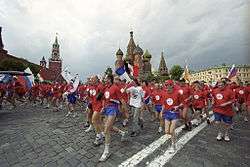
Football
Football is the number one sport in the country.[6][7][8][9] A high proportion of men are interested in it to a certain extent (and many children play it regularly) and women also join men when it comes to the national team. The Russian Premier League has a fairly high degree of competitiveness. Many notable talented foreign players have been and are playing in the Russian Premier League as well as local talented players worthy of a spot in the starting eleven of the best clubs.[10][11][12]
Russia was awarded the 2018 FIFA World Cup on the 2nd of December 2018, hosting the tournament for the first time.[13][14][15] The event took place from 14 June to 15 July 2018, in which the Russian team had its best performance since the 1966 tournament, reaching the quarter-finals for the first time since the breakup of the Soviet Union, where they lost to eventual finalists Croatia.[16]
Beach soccer is a popular sport in Russia since its International Growth in the late 1990s and with the establishment of the FIFA Beach Soccer World Cup by the national teams of the member associations of FIFA. Russia is amongst the most successful and dominant country of the sport, along with Brazil, Spain and Portugal.
Ice hockey
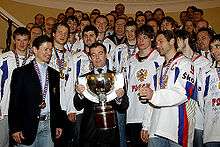

The Kontinental Hockey League (KHL) is mostly made up of Russian teams and is widely considered the second best league in the world, after the NHL. Russian teams have won every KHL championship.
Russia has won the World Championships several times:
| Year | Location | Result |
|---|---|---|
| 1993 | Dortmund / Munich, | Gold |
| 2008 | Quebec City / Halifax, | Gold |
| 2009 | Bern / Kloten, | Gold |
| 2012 | Helsinki, | Gold |
| 2014 | Minsk, | Gold |
Volleyball
- Gold medals (2002, 2011, 2013),5 silver medals (1993, 1998, 2000, 2007, 2010), 6 bronze medals (1997, 1997, 2001, 2006, 2008, 2009)
The Russian women's national volleyball team is ranked fifth in the FIVB World Rankings.
Record for achievements of the Russian women's volleyball team:
- 2 Olympic silver medals (2000 and 2004)
- 2 FIVB World Championships gold medals (2006 and 2010)
- 1 FIVB Volleyball World Grand Champions Cup gold medal (1997), 1 silver medal (2001), and 1 bronze medal (1993)
The Russian volleyball junior team continue to excel, in the FIVB men ranking for junior and youth, Russia is placed first the men.
Bandy
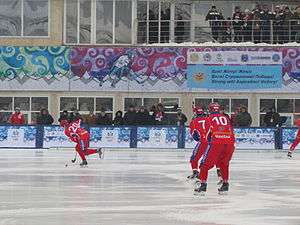
One traditionally popular sport is bandy (informally called "Russian hockey"). It is considered a national sport,[17] and is one of the biggest spectator sports.[18] According to one survey, it is the third most popular sport in Russia.[19] Most of the modern rules were written in England by Charles Goodman Tebbutt, but the Russians claim to be the inventors of the game, and indeed there were bandy-like games played in Russia before the modern rules were standardized. When Federation of International Bandy was founded in 1955, by the Soviet Union and three Nordic countries, a common set of rules were agreed upon. Mostly the English ruled prevailed. However, one important exception was the boards from the Soviet rules.
The Soviet national team won all the Bandy World Championships from the start 1957 until 1979. Russia is almost always one of the two best and has never missed out on a medal. The attendance has decreased in the last few years. It's still one of the biggest spectator sports though. After 10 rounds of the 2011–2012 Russian Bandy League the average attendance was 3,887.[20] The club with biggest public support is HC Kuzbass from Kemerovo. About 26,000 watched the opening game against Dynamo Moscow. Yenisey is the current (2015) champion of the domestic league.
The national team for women took the silver medal in the six first World Championships. In the 2014 WCS, the first gold medal came.
Bandy is the only sport to enjoy the patronage of the Russian Orthodox Church since they're very interested in strengthening their national traditions.[21]
Bandy is a team winter sport played on ice, in which skaters use sticks to direct a ball into the opposing team's goal. The rules of the game have many similarities to those of association football. The game is played on a rectangle of ice, the same size as a football field. Each team has eleven players, one of whom is the goalkeeper. A standard bandy match consists of two halves of 45 minutes each. The offside rule is also similar to that observed in football.
Biathlon
Biathlon is the most popular winter sport in Russia and ranking 1st in overall polls and TV viewership for the winter seasons. Russia has had many successful biathletes and has won Olympic and World medals. Notable biathletes include Vladimir Melanin, Nikolay Kruglov, Alexander Tikhonov, Valeriy Medvedtsev, Venera Chernyshova, Elena Golovina and Svetlana Petcherskaia during the Soviet era and Vladimir Drachev, Pavel Rostovtsev, Maxim Tchoudov, Viktor Maigourov, Olga Zaitseva and Anton Shipulin in the post-communist era.
Figure skating
_04.jpg)
Figure skating is another popular sport; in the 1960s the Soviet Union rose to become a dominant power in figure skating, especially in pairs skating and ice dancing. At every Winter Olympics from 1964 through 2006, a Soviet or Russian pair won gold, often considered the longest winning streak in modern sports history. The streak ended in 2010 when a Chinese pair won gold in 2010 Winter Olympics, a Russian pair returned to winning gold in pairs at the 2014 Winter Olympics in Sochi. Even after the fall of the Soviet Union, Russia still produced multiple Olympic and World Champions in figure skating notably Alexei Urmanov, Ilia Kulik, Alexei Yagudin, Evgeni Plushenko, Maria Butyrskaya, Irina Slutskaya, Adelina Sotnikova, Yulia Lipnitskaya, Maya Usova, Alexander Zhulin, Oksana Grishuk, Evgeni Platov, Anjelika Krylova, Oleg Ovsyannikov, Tatiana Navka, Roman Kostomarov, Ekaterina Gordeeva, Sergei Grinkov, Natalia Mishkutenok, Artur Dmitriev, Tatiana Totmianina, Maxim Marinin, Elena Berezhnaya, Anton Sikhuralidze, Tatiana Volosozhar, Maxim Trankov, Ksenia Stolbova, Fedor Klimov, Elena Ilinykh, Nikita Katsalapov, Elizaveta Tuktamysheva, Evgenia Medvedeva, Elena Radionova.
The Russian Figure Skating Championships are a figure skating national championship held annually to determine the national champions of Russia. Skaters compete at the senior level in the disciplines of men's singles, women's singles, pair skating, and ice dancing. The first Russian national competition was held on 5 March 1878 in St. Petersburg, Russian Empire. The winner was V. I. Sreznevski. From 1897–present, official Russian national championships in figure skating were held. The first national champion of Russia in figure skating was Alexandr Nikitich Panshin, who won the Russian nationals from 1897 to 1900.
Between 1924 and 1990 Russian national championships in figure skating were not held. During this time, Russian skaters competed at the Soviet Figure Skating Championships.
Speed skating
Long track speed skating
Speed skating has a long tradition of excellence since the Russian Empire with Nikolay Strunnikov being one of the pioneers in speed skating, then in the Soviet Union with Speed Skating greats Lidiya Skoblikova, Maria Isakova, the Stenins, Pavel Pegov, Lyudmila Titova, Sergey Khlebnikov, Yuri Mikhaylov, Natalya Petrusyova, Oleg Goncharenko, Inga Artamonova, Pavel Pegov, Tamara Rylova, Nina Statkevich, Nikolay Gulyayev, Igor Malkov, Galina Stepanskaya, Boris Shilkov, Tatyana Averina, Viktor Kosichkin, Klara Guseva, Valery Muratov, Sergey Marchuk, Maria Isakova, Oleg Bozhev, Yevgeny Grishin, Yevgeny Kulikov. Even after the collapse of the Soviet Union, the Russian Federation has maintained success in Speed Skating with Svetlana Bazhanova, Aleksandr Golubev, Yevgeny Lalenkov, Svetlana Zhurova, Dmitry Lobkov, Dmitry Dorofeyev, Sergey Klevchenya, Olga Fatkulina, Ivan Skobrev, Olga Graf, Aleksey Yesin. Among the new generation of Russian talents in Speed Skating taking the World Championships and World Cup titles include Natalya Voronina, Denis Yuskov, Pavel Kulizhnikov, Elizaveta Kazelina, and Ruslan Murashov.
Short track speed skating
Although short track is not as popular as long track in terms of results and history of winning tradition in Russia. It saw a major boost in popularity after the 2014 Sochi Olympics with Korean born Viktor Ahn who competed for Russia winning three gold medals in Sochi. Other successful athletes at the Olympics and doing well in the World Championships and World Cup competitions are local born speed skaters Semion Elistratov, Vladimir Grigorev, Dmitry Migunov, Sofia Prosvirnova, Tatiana Borodulina Viktoriya Troytskaya, and Ruslan Zakharov.
Other winter sports
Other winter sports the Soviets or Russia have been strong in are bobsleigh, skeleton and luge.
Basketball
Basketball is a popular sport in Russia. The Russian national basketball team is the heir of the Soviet Union national basketball team and has won several international titles.
Russia is home to several internationally recognized players such as Andrei Kirilenko, and 2016 NBA Champion Timofey Mozgov.
PBC CSKA Moscow is the second most successful team in the history of European club competitions.
Rugby union
Rugby union is a growing sport in Russia. Russia is ranked 17th worldwide by the International Rugby Board (IRB),[22] with over one hundred clubs and close to 20,000 players nationally.[23]
Russian domestic rugby went professional in 2005 with the launch of the Professional Rugby League. After a post-Soviet lull, Russian players are again signing with major clubs in England and France.
Krasnoyarsk, a large Siberian city, has traditionally been the stronghold of Russian rugby union. Domestic matches are covered in the local media, and the intra-city derby match between sides Krasny Yar and Enisei-STM can attract large crowds.
Rugby football in the Russian Empire pre-dated the Russian Revolution by a number of years, but it was only played sporadically. It appears to have been the first (non-indigenous) football code to be played in Russia, around a decade before the introduction of association football.[24] Mr Hopper, a Scotsman, who worked in Moscow arranged a match in the 1880s; the first football match was in 1892.[24] In 1886, however, the Russian police clamped down on rugby because they considered it "brutal, and liable to incite demonstrations and riots"[24] Condemnation by the tsar's police probably deterred many people from playing, and records of rugby over the next thirty years are sparse.
Russia qualified and competed in the 2011 Rugby World Cup in New Zealand as Europe 2 after finishing second in the 2008–10 ENC. This was the team's debut in the tournament, where they faced Australia, Ireland, Italy and the United States in Group C of the tournament. Being the second-lowest-ranked team in the tournament, Russia performed comparatively well in their opening match, running the USA close in an encounter which was lost 6–13. This was followed by comprehensive losses against Italy (53–17), Ireland (62–12) and Australia (68–22).
Rugby league
Rugby league is a growing sport in Russia. Russia is ranked 16th worldwide by the Rugby League International Federation (RLIF),[25] with over 2,000 participants nationwide.
Russian domestic rugby league is played at youth, student and adult levels.
Australian rules football
The first Australian rules football clubs in Russia were created in May 2011, with groups starting practice matches in Moscow and Krasnoyarsk within a few weeks of each other. Both fledgling clubs have been started by an expat Australian, but with the remainder of the playing group consisting of local Russians.[26][27]
Russia competed at the 2011 AFL 9s Euro Cup in Belfast, finishing in 10th place (out of 18), with wins over Catalunya and Denmark and losses to Croatia and Wales.
In 2013 there are five Australian Football clubs playing in a Moscow competition almost exclusively Russians. They are the Bees, Cherkizon, Shooters, Cosmic Pirates and Slava.
In 2015 St. Petersburg Cats team firstly took part in Gagarin Cup, ANZAC Cup and Concrete and Steel cup. In 2015 May, the ANZAC Day Cup was played for the first time in Saint Petersburg at the Kolomyagi Stadium. The visiting team representing Moscow was the Lazy Koalas. The result was very lopsided, but the fact that a formal game was played outside Australia at all for such an insignificant sport was considered a success. Scores: Lazy Koalas (Moscow) 921 defeated Saint Petersburg 13 with the game called off at halftime due to a mercy rule taking effect. In 2016 Russian national team took part in AFL Europe Cup in Lisbon
Tennis
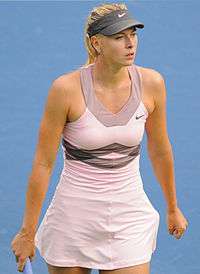
Since the end of the Soviet era, tennis has grown in popularity and Russia has produced a number of famous tennis players. In recent years, the amount of top Russian women players has been considerable, with both Maria Sharapova and Dinara Safina reaching number one in the WTA rankings. Other Russian women to achieve international success include Elena Dementieva, Ekaterina Makarova, Svetlana Kuznetsova, Anastasia Myskina, Nadia Petrova, Vera Zvonareva, Elena Vesnina, Anna Chakvetadze, Anastasia Pavlyuchenkova and Anna Kournikova. The Russian Federation has won the Fed Cup 4 times, in 2004, 2005, 2007 and 2008.
At the 2008 Beijing Olympics, Russia swept the women's tennis podium with Elena Dementieva winning the gold, Dinara Safina and Vera Zvonareva the silver and bronze, respectively. As of 16 October 2009, two Russian women were ranked in the WTA tour's top 10; with an additional two in the Top 20.
Russia also boasts two former number 1 men's players—Safina's older brother Marat Safin and Yevgeny Kafelnikov. Other Russian men that have made the top 50 include Nikolay Davydenko, Igor Andreev, Igor Kunitsyn, and Mikhail Youzhny. The Russian men won the Davis Cup in 2002 and 2006.
Among Russia's new talents helping to continue the sporting tradition includes, Daria Kasatkina, Andrey Kuznetsov, Margarita Gasparyan, Andrey Rublev, Sofya Zhuk, and Roman Safiullin.
Gymnastics
Rhythmic gymnastics
Rhythmic gymnastics is considered one of the most popular sports in Russia. In addition, it is considered in general that Russia has the best rhythmic gymnasts. Evgenia Kanaeva, three-time all around world champion and first and only back to back gold medallist at the olympic games, Yulia Barsukova, Irina Tchachina, Galina Beloglazova, Irina Devina, Tatiana Druchinina, Elena Karpuchina, Tatiana Kravtchenko, Galima Shugurova, Oxana Kostina, Alina Kabaeva, Natalia Lipkovskaya, Daria Dmitrieva, Amina Zaripova, Daria Kondakova, Laysan Utiasheva, Zarina Gizikova, Daria Shkurikhina, Vera Sessina, Margarita Mamun, Yelena Posevina, Anastasia Maksimova, Olga Ilina, Anna Gavrilenko, Karolina Sevastyanova, Anastasia Bliznyuk, Alina Makarenko, Ksenia Dudkina, Anastasia Nazarenko, Uliana Donskova, Margarita Aliychuk, Yanina Batyrchina, Tatiana Gorbunova, Maria Titova, Aleksandra Soldatova, Yana Kudryavtseva, Daria Svatkovskaya, Dina Averina, Arina Averina, Veronika Polyakova, Yulia Bravikova, Daria Dubova, Sofya Skomorokh and Diana Borisova are amongst Russia's successful and top rhythmic gymnasts. There are many rhythmic gymnastics clubs in Russia and the most famous one is the Gazprom School which Irina Viner teaches rhythmic gymnasts in Novogorsk, Moscow, where the Russian National team is also based.
Artistic gymnastics
Before the breakup of the Soviet Union in 1991, Soviet gymnasts dominated both men's and women's gymnastics commencing with the introduction of the full women's program into the Olympics and the overall increased standardization of the Olympic Gymnastics competition format which happened in 1952. From 1952 to 1992 inclusive, the Soviet women's squad won almost every single team title in World Championship competition and at the Summer Olympics: the only four exceptions were the 1984 Olympics, which they did not attend, and the 1966, 1979 and 1987 World Championships. Some of the famous Soviet gymnasts were from the Russian SFSR, or of Russian origin born in the former SSR.
Following the breakup of the Soviet Union, they competed together as one nation for the last time at the 1992 Summer Olympics as a "Unified Team" winning the gold. though not as dominant as the Soviet Union and with the emergence of new countries excelling in gymnastics and having a gymnast apparatus specialist, Russia has maintained the tradition of gymnastics excellence, medalling at every Worlds and Olympic competition in both MAG and WAG disciplines, except in the 2008 Olympics, where the Russian women team did not win any medals. Notable Russian gymnasts include: Svetlana Khorkina, Alexei Nemov, Nikolai Andrianov, Alexander Dityatin, Larissa Latynina, Yelena Shushunova, Elena Zamolodchikova, Natalia Yurchenko, Elena Mukhina, Olga Mostepanova, Yuri Titov, Anton Golotsutskov, Yekaterina Lobaznyuk, Yelena Produnova, Natalia Shaposhnikova, Ludmilla Tourischeva, Anastasia Grishina, Aleksandr Balandin, Maria Paseka, Nikolai Kuksenkov, Ksenia Afanasyeva, Aliya Mustafina, Denis Ablyazin, Emin Garibov, Viktoria Komova, David Belyavskiy, Nikita Nagornyy, Maria Kharenkova, Nikita Ignatyev, Daria Spiridonova, Angelina Melnikova, Natalia Kapitonova, Andrei Makolov, Elena Eremina and Seda Tutkhalyan.
Swimming and diving
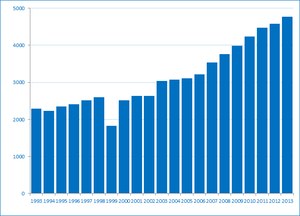
Swimming is mostly an elite sport for most Russians, however before the dissolution of the USSR, Swimming was an institutionalized and recreational sport and excelled in the Olympic Games competing against East Germany in the total swimming medals table. Russia has not achieved the same success as that of the Soviet Union nevertheless there has still been a few notable Russian swimmers that excelled, Alexander Popov, a four-time Olympic gold medalist is regarded as one of the greatest sprint freestyle swimmers of all time, and the only male swimmer in history to win four individual Olympic gold medals in freestyle events. Other Notable Russian swimmers in the 1990s and early 2000s include: Denis Pankratov, Yevgeny Sadovyi, Vladimir Pyshnenko, Yury Prilukov, Arkady Vyatchanin, Roman Sludnov, Andrey Grechin. After the 2012 Summer Olympics, Russia's new elite swimmers have shown improved results.
Diving is also a sport in Russia with a long soviet tradition.
Russia has dominated synchronized swimming at the Olympic Games and World Championships since the 2000 Sydney Olympics. Notable Olympic champions and synchronized swimmers include: Anastasia Davydova, Anastasia Ermakova, Natalia Ishchenko, Svetlana Romashina, Darina Valitova and Aleksandr Maltsev.
Athletics
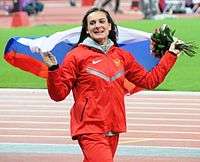
Russia has maintained strong results particularly in High jump, Long jump, track athletics, Hurdling, Pole vault, racewalking, Hammer throw, Triple jump, Javelin throw, Heptathlon. Some well known Russian athletes include Yelena Isinbayeva, Anna Chicherova, Ivan Ukhov, Tatyana Lysenko, Yuliya Zaripova, Natalya Antyukh, Mikhail Ryzhov, Andrey Silnov, Aleksandr Ivanov, Ekaterina Koneva, Yelena Slesarenko, Sergey Shubenkov, Mariya Kuchina, Yuriy Borzakovskiy, Darya Klishina, Aleksandr Menkov, Aleksey Fyodorov, Elena Lashmanova, Lyukman Adams, Daniil Tsyplakov, Ilya Shkurenyov.
Russia was banned from the 2017 and 2019 World Championships because of state-sponsored doping.
Orienteering
The Russian Orienteering Federation (Russian: Федерация Спортивного Ориентирования (ФСО)) is the Russian national organisation of orienteering. It is a full member of the International Orienteering Federation.[28]
Boxing
Russia is a boxing country powerhouse with many world title holders, Olympic champions and legends of the sport. Successful professional and amateur boxers include: Alexander Povetkin, Nikolai Valuev, Dmitry Bivol, Eduard Troyanovsky, Aleksei Tishchenko, Kostya Tszyu, Evgeny Tishchenko, Sergey Kovalev, Albert Tumenov, Magomed Abdusalamov, Shamil Sabirov, Oleg Maskaev, Dmitry Kudryashov, Boris Kuznetsov, Aleksandr Lebziak, Sofya Ochigava, Oleg Saitov, Georgy Balakshin, Oleg Grigoryev, Vassily Solomin, Nikolay Korolyov, Raimkul Malakhbekov, Evgeny Makarenko, Alexander Maletin, Alexei Lezin, Gennady Kovalev, Sergey Kazakov, Matvey Korobov, Sultan Ibragimov, Artur Beterbiyev, Misha Aloyan, Denis Boytsov, Dmitry Chudinov, Fedor Chudinov, Gennadiy Shatkov, Grigory Drozd, Egor Mekhontsev, David Ayrapetyan, Boris Lagutin, Denis Lebedev, Rashid Magomedov, Ruslan Provodnikov, Viktor Rybakov, Vladimir Safronov, Stanislav Stepashkin, Valerian Sokolov, Vasilii Egorov, Vitaly Dunaytsev,
Judo
Russia has become a key player in sport of Judo, even under the Soviet Union, it has produced multiple Olympic champions and medalists. The popularity was increased under President Vladimir Putin promoting the sport, and with Russia producing multiple Olympic and World champions. Notable judokas over the decades include: Vladimir Nevzorov, Kamal Khan-Magomedov, Alexander Mikhaylin, Oleg Stepanov, Anatoly Laryukov, Beslan Mudranov, Tamerlan Tmenov, Ivan Nifontov, Arsen Galstyan, Sergei Kosorotov, Mansur Isaev, Nikolai Solodukhin, Elena Ivashchenko, Kirill Denisov, Tagir Khaybulaev, Sergei Kosmynin, Vitali Kuznetsov, Natalia Kuziutina, Vitaliy Makarov, Serhiy Novikov, Mikhail Pulyaev, Dmitri Sergeyev, Yury Styopkin,
Martial arts
Mixed martial arts is another popular sport producing many world class international and national fighters.
Notable athletes include: Fedor Emelianenko, Batu Khasikov, Oleg Taktarov, Vitaly Minakov, Rasul Mirzaev, Julia Berezikova, Andrey Koreshkov, Vyacheslav Vasilevsky, Sergei Kharitonov, Khabib Nurmagomedov, Vladimir Mineev, Muslim Salikhov, Murad Machaev, Viktor Nemkov, Adlan Amagov, Islam Makhachev, Ramazan Ramazanov, Zubaira Tukhugov, Volk Han, Omari Akhmedov, Sultan Aliev, Vener Galiev, Ali Bagautinov, Alexander Ustinov, Rustam Khabilov, Alexander Sarnavskiy, Ruslan Magomedov, Artem Levin, Alexander Volkov, Albert Tumenov, Rashid Magomedov, Alexander Emelianenko, Bazigit Atajev, Magomedrasul Khasbulaev, Artem Vakhitov, Magomed Magomedov, Mikhail Ilyukhin, Shamil Zavurov, Bazigit Atajev, Denis Grachev, Ruslan Karaev, Milana Dudieva, Suleyman Magomedov, Alexei Papin, Aleksandr Pitchkounov, Oleksiy Oliynyk, Georgi Karakhanyan, Andrei Semenov, Alexander Shlemenko, Akop Stepanyan, Amar Suloev, Alexander Yakovlev, Michail Tsarev, Mikhail Zayats, Roman Zentsov.
Other popular martial arts form is Sambo which originated in the Soviet Union.
Weightlifting
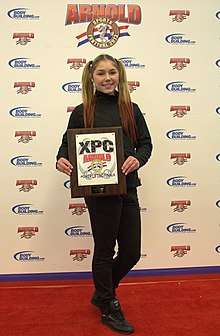
Weightlifting is another successful sport in Russia, after the dissolution of the Soviet Union, Russia ranks 16th in the all-time medal table. Among the most titled and popular weightlifter is Vasily Alekseyev, Russia and the Soviet Union's greatest Weightlifter who set multiple World records unprecedented in his era and was a twice Olympic champion.
Another popular strongman competition in Russia is Powerlifting, which is akin to a variant evolving from weightlifting. Russia is an active in the International Powerlifting Federation and one of the most successful countries along with the United States, Poland, Norway, United Kingdom, Taiwan, Sweden, Finland, Japan and the Ukraine. Maryana Naumova is the youngest World champion and multiple record holders in professional powerlifting tournaments and World championships.
Wrestling

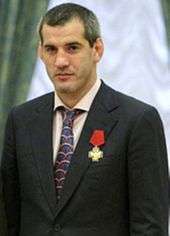
The Soviet Union was the most successful country in the history of wrestling, Russia has continued the tradition and has produced multiple Olympic and World champions. Wrestling is the most accessible and played out sport for boys and young adults in Russia especially in the Caucasus Republics and regions (Chechnya, Dagestan, Karachay-Cherkessia, North-Ossetia, Kabardino-Balkaria, Ingushetia).
Fencing
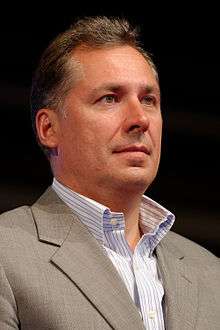
Russia has maintained a strong tradition in Fencing since Tsarist Russia where it was a popular sport amongst the Russian elites, it transitioned into the Soviet Union as a sport for the Soviet fencing enthusiasts and became a visible sport for the Soviet people which reached its peak in the 1980s in terms of success and popularity of the Sport in the USSR. After the dissolution of the Soviet Union, like the former Soviet Republic of Ukraine, Russia has continued the success in fencing producing multiple World and European Champions. Successful Russian fencers over the decades include: Viktor Sidyak, Galina Gorokhova, Yana Zvereva, Sofiya Velikaya, Aleksey Yakimenko, Stanislav Pozdnyakov, Valentina Rastvorova, Yekaterina Dyachenko, Kamil Ibragimov, Pavel Kolobkov, Eduard Vinokurov, Karina Aznavourian, Renal Ganeyev, Vladimir Nazlymov, Artur Akhmatkhuzin, Nikolay Kovalev, Inna Deriglazova, Tatiana Logunova, Diana Yakovleva, Umyar Mavlikhanov, Elena Novikova-Belova, Veniamin Reshetnikov, Dina Galiakbarova, Timur Safin, Aida Shanayeva, Sergey Sharikov, Yury Sisikin, Yuliya Biryukova, Yana Egorian, Violetta Kolobova, Lyubov Shutova, Anna Sivkova, Mark Rakita, Alexandra Zabelina, Aleksey Cheremisinov.
Chess
Chess is a favorite pastime, and a sport that has been dominated by Russians in the post-war (1945–) era. The winner of the 1948 World Chess Championship, Russian Mikhail Botvinnik, started an era of Soviet dominance in the chess world. Until the end of the Soviet Union, there was only one non-Soviet champion.
The 1990s were dominated by Kasparov, who won most of the tournaments that he participated in and reached a then-record rating of 2851 on the July 1999 list.[29]
Today, 25 of the world's top 100 chess players are Russian.[30]
Motorsport
Vitaly Petrov became Russia's first Formula One driver in 2010. So far he has driven in F1 for three seasons with the Renault and Caterham F1 teams. He scored the best result of his career when he finished third at the 2011 Australian Grand Prix. Daniil Kvyat made his debut in F1 in 2014. He took his first podium finish with a second place at the 2015 Hungarian Grand Prix.[31] A Russian Grand Prix joined the calendar for the 2014 Formula One season, held at the Sochi Autodrom. Sergey Sirotkin joined the F1 circuit in 2018.
Timur Timerzyanov has enjoyed success in rallycross, winning the FIA European Rallycross Championship in 2012 and 2013.
Russian car manufacturer Lada (known domestically as AvtoVAZ) has competed in the World Touring Car Championship, making their debut in 2008 with Russian Bears Motorsport entering Lada 110s. Lada provided factory support in 2009, with the team running three cars and upgrading to the Lada Priora during the season. The team's best performances were a pair of sixth places by James Thompson at the Race of Italy. Lada subsequently withdrew from the championship, but they returned in 2012, entering a Lada Granta WTCC driven by Thompson at a couple of race meetings. Subsequently, they announced plans to contest a full season in 2013. The team ran two cars in 2013, with a best result of a fifth place for Thompson in the Race of Russia, and expanded to a three car squad for 2014. Former World Touring Car Champion Robert Huff gave Lada their first WTCC win at the 2014 Beijing round.[32]
See also
References
- Planet, Lonely; Richmond, Simon; Bennetts, Marc; Duca, Marc Di; Haywood, Anthony; Kaminski, Anna; Masters, Tom; Sheward, Tamara; Louis, Regis St; Vorhees, Mara (1 February 2015). "Lonely Planet Russia". Lonely Planet. Retrieved 16 December 2017 – via Google Books.
- "Google Translate". Translate.google.com. Retrieved 16 December 2017.
- "Google Translate". Translate.google.com. Retrieved 16 December 2017.
- "With one year until 2018 Winter Games, Russia's status murky". Espn.com. 9 February 2017. Retrieved 16 December 2017.
- "IOC suspends Russian NOC and creates a path for clean individual athletes to compete in PyeongChang 2018 under the Olympic Flag". Olympic.org. 5 December 2017. Retrieved 16 December 2017.
- Suzanne J. Murdico (2005). Russia: A Primary Source Cultural Guide. The Rosen Publishing Group. pp. 96–. ISBN 978-1-4042-2913-6. Retrieved 19 November 2013.
- Dzhusoity, Afsati; Kuznetsov, Petr (30 August 2013). "Russian soccer loses Abramovich's funding". Russia Beyond the Headlines. Rossiyskaya Gazeta. Retrieved 19 November 2013.
- Brown, Des (15 October 2013). "Russia's Soccer Relationship With England". The Moscow Times. The Moscow Times. Retrieved 19 November 2013.
- Smith, Chris. "Russia – A developing football nation". Total Football Magazine. Total Football Magazine. Retrieved 19 November 2013.
- Nsehe, Mfonobong (12 August 2011), "Soccer Star Samuel Eto'o To Earn $25 Million With Russian Team", Forbes, Forbes.com LLC, retrieved 19 November 2013
- "Russia cracks down on hooligans". Fox Sports. Fox Sports Australia Pty Limited. 22 June 2013. Retrieved 19 November 2013.
- Murphy, Chris (25 October 2013). "World Cup: Russian racism furore is the latest headache for FIFA". CNN. Cable News Network. Retrieved 19 November 2013.
- "World Cup 2018 host Russia has a serious soccer hooligan problem". news.com.au. News Limited. 31 October 2013. Retrieved 19 November 2013.
- Williams, Carol J. (14 August 2013). "Soccer World Cup 2018 host is asked to explain anti-gay law". Los Angeles Times. Tribune Company. Retrieved 19 November 2013.
- Bird, Liviu (31 October 2013). "Russia's racism stems from lack of education but can be reversed, experts say". NBC Sports: ProSoccerTalk. NBC Sports. Retrieved 19 November 2013.
- Roth, Andrew (8 July 2018). "Blood, sweat and beers: Russia down but proud after World Cup exit". The Guardian. ISSN 0261-3077. Retrieved 19 February 2019.
- "Russian bandy players blessed for victory at world championship in Kazan". Tatar-Inform. 21 January 2011. Archived from the original on 24 April 2012. Retrieved 31 August 2009.
- "Google Translate". Translate.google.com. Retrieved 16 December 2017.
- "Google Translate". Translate.google.co.uk. Retrieved 16 December 2017.
- "Google Translate". Translate.google.com. Retrieved 16 December 2017.
- "Google Translate". Translate.google.com. Retrieved 16 December 2017.
- "Official IRB Rankings". Irb.com. Archived from the original on 10 August 2011. Retrieved 16 December 2017.
- "Official Russia Playing Numbers". Irb.com. Archived from the original on 21 October 2007. Retrieved 16 December 2017.
- Riordan, James Sport in Soviet Society — development of sport and physical education in Russia and the USSR (Cambridge University Press, Cambridge, England, 1977) p22
- "RLIF – Rugby League International Federation". Rlif.com. Retrieved 16 December 2017.
- "Russia's 2nd footy club springs up in a month – World Footy News". Worldfootynews.com. Retrieved 16 December 2017.
- "Plans in motion to create Russia's first footy club – World Footy News". Worldfootynews.com. Retrieved 16 December 2017.
- "IOF Member Federations". International Orienteering Federation. Archived from the original on 18 June 2008. Retrieved 20 June 2008.
- "A History of Chess in Russia". chess24.com. 24 May 2020.
- Administrator. "FIDE Online. FIDE Top players – Standard Top 100 Players December 2017". Ratings.fide.com. Retrieved 16 December 2017.
- "Vettel beats Kvyat and Ricciardo in Hungarian thriller". Formula1.com. 26 July 2015. Retrieved 26 July 2015.
- Mills, Peter (5 October 2014). "Beijing Goldenport WTCC: Rob Huff gives Lada maiden WTCC win". Autosport.com. Retrieved 16 October 2014.
